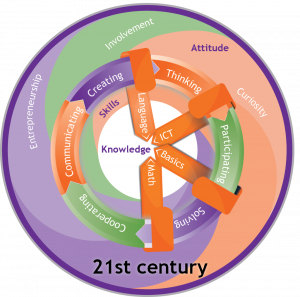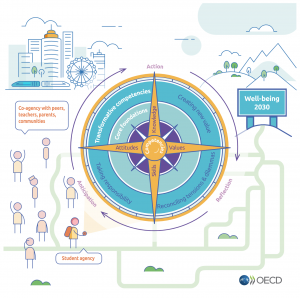2 A Note about Skills for Digital Age
Elena Chudaeva

Technological progress, new business models, climate change and the COVID-19 pandemic are changing every aspect of Canadians’ lives, including schools, workplaces, and expectations at school and at work. With more and more automation and use of robots, it is likely that the capacity to contribute to the creative process will become more valued in the coming decades (OECD, 2021). These changes impact the skills Canadians need for jobs and the way they develop these skills (Future Skills, n.d.). According to OECD (2020), Canadians require opportunities to upskill and retrain throughout their working life to remain employable as the world of work evolves. In this changing world all learners will need to develop such skills as creativity, critical thinking, problem solving, communication, digital fluency, scientific literacy, and resiliency in order to be successful.
Studies show that creativity and soft skills such as social and emotional skills are closely related to student well-being and academic performance (OECD, 2021). Additionally, research shows that employers are looking for these soft skills when hiring new employees in addition to subject matter expertise and knowledge (Pate, 2020; Petrone, 2019). For example, research by LinkedIn Learning has found in recent years that “creativity” was the “soft skill” most demanded by companies (Pate, 2020; Petrone, 2019).
This guidebook is about STEM activities; however, adding Art to STEM can help to develop a more holistic approach to education. Introducing STEAM (Science, Technology, Engineering, Art, Mathematics) resources into the curriculum allows both educators and students to develop the core competencies mentioned above to succeed in the digital age. Integrating a STEAM approach to designing learning material and activities also supports the development of multiple literacies. The term multiple literacies refers to our ability to ‘read’ the world and interpret the many formats, sources, and media through which we obtain information. In addition to the visual, audio, linguistic, and spatial ways of meaning-making, we need to include digital literacy and technological literacy.
Digital literacy relates to our ability to locate, evaluate, and synthesize digital sources. Technological literacy relates to our ability to use technology both ethically and safely. Integrating online resources into curriculum allows learners to practice these skills in addition to mastering subject matter.
Skills for Future Success
The Information and Communications Technology Council of Canada identified the following categories of valuable and necessary skills for future success (Ivus et al., 2021, p.22):
Technical skills:
- Digital literacy.
- Information/media literacy.
- Digital engagement.
- Data and analytics competencies.
Human (soft) skills:
- Digital curiosity.
- Interpersonal communication.
- Confidence.
- Flexibility/adaptability.
- Digital engagement.
“Digital engagement” appears in both categories because it is a multidisciplinary skill. We believe that incorporating interactive web resources to our curriculum helps develop and practice all of these skills.
Learning Compass
Additionally, OECD Learning Compass 2030 identified Knowledge, Values, Attitudes, and Skills as important components for students’ future success:
- Knowledge includes theoretical concepts and ideas in addition to practical understanding based on the experience of having performed certain tasks.
- Attitudes and values, a key component of the OECD Learning Compass 2030, refer to the principles and beliefs that influence one’s choices, judgements, behaviours and actions on the path towards individual, societal and environmental well-being.
- Skills are the ability and capacity to carry out processes and be able to use one’s knowledge in a responsible way to achieve a goal. They involve mobilizing knowledge, skills, attitudes and values to meet complex demands. The OECD Learning Compass 2030 distinguishes between three types of skills: cognitive and metacognitive skills; social and emotional skills; and practical and physical skills.

The Learning Compass 2030 defines the knowledge, skills, attitudes and values that learners need to fulfil their potential and contribute to the well-being of their communities and the planet.
Integrating interactive digital activities into curriculum helps develop subject matter expertise, provides students with an opportunity to develop skills for the digital age, and develop creativity and innovation among teachers. Resources discussed in this book allow for the creation of flexible learning environments enabled by technology that extends outside the classroom (i. e., blended and online learning, field trips, and so on).
Additional Resources
EDUCAUSE Learning Initiative: 7 Things You Should Know About Digital Literacies.
References
Future Skills. (n.d.). Government of Canada. https://www.canada.ca/en/employment-social-development/programs/future-skills.html.
Ivus, M., Quan, T., Snider, N., 21st Century Digital Skills: Competencies, Innovations and Curriculum in Canada (March 2021), Information and Communications Technology Council (ICTC). https://www.ictc-ctic.ca/wp-content/uploads/2021/04/21st-century-digital-skills.pdf.
OECD. (2020). Workforce innovation to foster positive learning environments in Canada: Getting skills right. OECD Publishing. https://www.oecd-ilibrary.org/employment/workforce-innovation-to-foster-positive-learning-environments-in-canada_a92cf94d-en.
OECD. (2021). Beyond academic learning: First results from the survey of social and emotional skills. OECD Publishing. https://read.oecd-ilibrary.org/education/beyond-academic-learning_92a11084-en#page1.
Pate, D. (2020, January 13). The top skills companies need most in 2020 – and how to learn them. LinkedIn. https://www.linkedin.com/business/learning/blog/top-skills-and-courses/the-skills-companies-need-most-in-2020and-how-to-learn-them.
Petrone, P. (2019). The skills companies need most in 2019 – and how to learn them. LinkedIn. https://www.linkedin.com/business/learning/blog/top-skills-and-courses/the-skills-companies-need-most-in-2019-and-how-to-learn-them.

